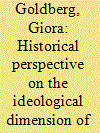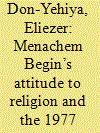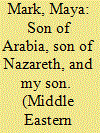|
|
|
Sort Order |
|
|
|
Items / Page
|
|
|
|
|
|
|
| Srl | Item |
| 1 |
ID:
122063


|
|
|
|
|
| Publication |
2013.
|
| Summary/Abstract |
The hallmarks of the Revisionist political platform, such as opposition to the project of the enlarged Jewish Agency or the idea of fundamental land and fiscal reform in Palestine aimed at an intensification of the settlement endeavour, began to appear spontaneously, particularly in Russo-Ukrainian Zionist circles, during the second quarter of 1922. The so-called 'Our Platform', a series of articles setting out the Revisionist proposals, published in March 1924, was a joint undertaking and the culmination of numerous, sometimes inconclusive, discussions. The creation of the Union of Zionists-Revisionists sealed this process in 1925. The aim of this article is to investigate the three-year prelude to the organized Revisionist movement, highlighting the role performed by activists, almost all of whom have been forgotten over time (J. Brutzkus, S. Gepstein, J. Schechtman and I. Trivus, among others). It identifies the opposition to the enlarged Jewish Agency project (and not the rejection of the White Paper of 1922) as the main galvanizing point of the process. Last, but not least, it argues that many of the political notions commonly attributed to Jabotinsky actually originated with others among the Revisionist founders.
|
|
|
|
|
|
|
|
|
|
|
|
|
|
|
|
| 2 |
ID:
163294


|
|
|
|
|
| Summary/Abstract |
This article argues that since 1977 policy changes of the new Likud government were small, but they engendered a tremendous shift in consciousness, as well as a symbolic change. Israel’s character as a Jewish state was greatly augmented. A new Israeli identity emerged, grounded primarily in Jewish roots with a preference for communal over state identity. Political ideologies in democracies are poor. The ‘iron law of ideology’ states that political parties, principally those that form governments, do not realise their ideological principles. The case of Herut, the maternal party of Likud, is a typical example of this law.
|
|
|
|
|
|
|
|
|
|
|
|
|
|
|
|
| 3 |
ID:
163288


|
|
|
|
|
| Summary/Abstract |
The image of Herut as characterised by a strong linkage to Jewish religious tradition had a profound impact in the Israeli political arena. It motivated many of the religious and traditional public to support this party and later its successor, Likud. It also provided an incentive for the religious parties to join the government coalitions headed by Likud in the wake of the ‘political reversal’ of 1967. In this way, the public image of Likud as a ‘religious oriented party’ significantly contributed to the transformation of political power from Labour to Likud.
|
|
|
|
|
|
|
|
|
|
|
|
|
|
|
|
| 4 |
ID:
186157


|
|
|
|
|
| Summary/Abstract |
This article focuses on the campaign waged by Herut, a right-wing National-Liberal party and its leader, Menachem Begin, to abolish the Military Government imposed on the Arab citizens of Israel between the years 1948-1966. The article draws on multiple sources that have not yet been studied to analyze Herut’s struggle for the annulment of the Military Government, while placing it in a broad historical and political context. It shows that Herut derived certain political benefits by campaigning for the annulment of the Military Government. However, it also establishes that Herut paid a price for its campaign, suffering criticism from within the right-wing political camp and wrestling with allegations from the left-wing political camp. The analysis of Herut’s campaign for the annulment of the Military Government illuminates the liberal ideological foundations of the movement that has held sway in Israel for over four decades, affirming its commitment to liberal values, and the belief of its founding father, Begin, in civic equality between Jews and Arabs in Israel.
|
|
|
|
|
|
|
|
|
|
|
|
|
|
|
|
|
|
|
|
|